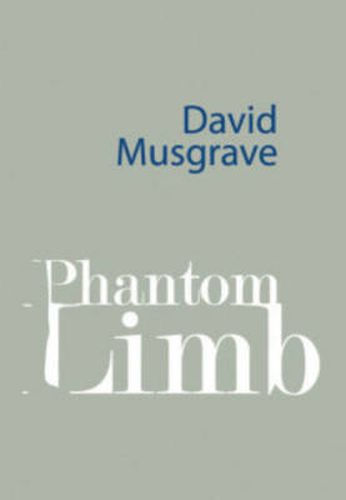
- Free Article: No
- Contents Category: Poetry
- Review Article: Yes
- Article Title: Metaphor Man
- Online Only: No
- Custom Highlight Text:
Carphology, in case you have forgotten, is the ‘delirious fumbling with bedclothes’, as stated in the epigraph to David Musgrave’s poem of the same name, which is not about a pathology but, energetically though bleakly, about passion and sleep. The epigraph to the book as a whole is taken from Christopher Smart’s Jubilate Agno, fragment C1: ‘God be gracious to Musgrave, for he is a Merchant.’ Tongue in cheek, but Musgrave does indeed have wares and they are finely assembled configurations of words. The poems in Phantom Limb often suggest, rather than explicitly display, Musgrave’s erudition. There is a communicative ease about the enterprise, if this can be said about poems that continue to declare themselves after multiple readings. In them there are elusive depths combined with surface pleasures.
- Book 1 Title: Phantom Limb
- Book 1 Biblio: John Leonard Press, $24.95 pb, 68 pp
- Book 1 Cover Small (400 x 600):

This we might expect in a collection which is so preoccupied with water in its many manifestations. The title of the opening poem is ‘Open Water’, that of the final poem, ‘Rain’. In between, among others, there are ‘Death by Water’ (parts 1 and 2), ‘Dew’, ‘Ice’, ‘Puddles’, ‘Tsunami’ and so on. Water is seen as reflecting and refracting our lives; it is transformative. This means that Musgrave often approaches situations from surprising angles – from the point of view of a glass of water, for instance. Perhaps a key passage is from ‘Bodies of Water’:
I have seen how, like a dream
that keeps returning
we move from state to state,
water flowing through us,
we through water,
a consciousness, a breath.
There is often the sense of how easily lives can be cancelled out or, at least, randomly altered. ‘Death by Water 2’ begins ‘It’s little wonder I write about water’, and then proceeds to narrate a history of drownings among Musgrave’s forebears, a history where ‘fiction flows into fact, fact into fiction’. This fluidity is intensified by the flexible rhythms of the poems that apply pressure to, but never weaken, their formal precision.
There is fluidity of subject matter as well, where ‘boundaries are blurred’. In the case of the superb ‘Tears’, it is between colonisers and the colonised; in ‘Tsunami’, metaphorical links are effortlessly made between the wave, thugs and, amazingly, a poet who satirises his nation’s leader.
Sometimes there is an interesting tension between exuberance and restraint. Musgrave has a highly visual imagination. In ‘The Well’, he sounds like a latter-day Martian or, as the English poets associated with the Martian ‘movement’ were also known, one of the Metaphor Men. His love of metaphor leads him to mock or check this predilection in ‘Clouds, Lake Titicaca’, where he intersperses ‘the tedious old fool’ Polonius’s similitudes in Hamlet with his own exuberances. That is, if he’s not mocking Polonius.
Lake Titicaca? Yes, these poems get about – and there is much more than water lapping at their edges. Musgrave has a restless curiosity and is wise when reflecting on his own processes and procedures. He describes his eye as being ‘a hungry nomad … hunting a vision into its socket’. This can lead him into some wild rides, and he can be darkly funny. ‘Velocity’, a poem ostensibly about a dying man, is absurdly energetic and playful. To do it justice, the poem would need to be quoted at length. Instead, here is the terse ‘On the Inevitable Decline into Mediocrity of the Popular Musician who Attains a Comfortable Middle Age’: ‘O Sting, where is thy death?’ Musgrave is not the first poet to place a single line beneath a portentous title – John Ashbery is another – but it is an expert way to disrupt an established tone in a book.
The most ambitious – and long – poems are ‘Young Montaigne Goes Riding’ and the prize-winning ‘The Baby Boomers’. Boomers are ripe for satire, and Musgrave has done a fine job of exposing members of a generation whose failed ideals have morphed into materialism and self-indulgence. In some ways they are straw dogs. We don’t find out much about them as individuals, but we do know their attitudes: ‘the cogwheels of their conversation, negatively geared / are running backwards towards the day’s great revolution, sleep.’
In ‘Young Montaigne Goes Riding’, the long ride is itself a metaphor for Montaigne’s ways of pondering and experiencing the world. No wonder, given Musgrave’s range of interests, he is drawn to the great pre-Enlightenment essayist’s insatiable curiosity – as much perhaps as to his modesty, scepticism and sanguinity. This sympathetic monologue captures the spirit of Montaigne perfectly and draws the other poems gravitationally into its orbit. It is thoughtful, stately and measured – though not the most daring poem in a collection where the direction of an individual poem can surprise as much as the overall variety. Water is a focus, but it affects matters ranging from white settlement to professional football.
Phantom Limb is an engaging, conceptually satisfying and often deeply moving collection. It is a staple of poetry to shake up the familiar and make it strange. Musgrave does this, but rarely for its own sake. There is nearly always more going on. He not only describes the world but also quizzes and examines it with an illuminating restlessness that this reader is grateful not to have missed.


Comments powered by CComment